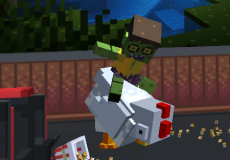

Storyteller
Advertisement
Storyteller places you in the role of the one shaping the events of short illustrated tales. Each puzzle presents a title and a set of empty frames, asking you to construct a fitting story using a limited number of characters, locations, and items. You are not given lines of dialogue or written choices—instead, your decisions take form through visual outcomes and character reactions. The result is a system of cause and effect that encourages players to think through the logic of narrative construction.
Advertisement
Similiar games
Storyteller places you in the role of the one shaping the events of short illustrated tales. Each puzzle presents a title and a set of empty frames, asking you to construct a fitting story using a limited number of characters, locations, and items. You are not given lines of dialogue or written choices—instead, your decisions take form through visual outcomes and character reactions. The result is a system of cause and effect that encourages players to think through the logic of narrative construction.
Solving With Structure
Each story has its own internal logic. You must figure out who should appear in which scene, what sequence of events must occur, and how relationships should shift from beginning to end. The challenges increase as more complex story goals are introduced. You might be asked to show a betrayal, a reunion, or a revenge plot. While the goal remains the same—fit the story to the title—the paths to that goal multiply.
Core Elements of the Gameplay:
- Dragging characters into panels to trigger specific scenes
- Swapping elements between panels to change the story flow
- Matching character interactions to the scenario prompt
- Discovering alternate endings for some puzzles
- Completing bonus challenges for optional objectives
These mechanics are designed to be accessible while allowing space for experimentation.
Built for Short Sessions
Storyteller does not require long time investments. Each puzzle can be approached in a few minutes, making it suitable for quick play sessions. At the same time, the puzzles often invite replay, as players return to test out alternate combinations or solve hidden tasks. There is no penalty for getting things wrong, and every mistake teaches something about how the game’s logic works. It becomes a cycle of trying, observing, and adjusting until the result fits.
A Game About Story Logic
Instead of following a fixed plot, Storyteller lets you discover how simple rules can produce complex results. It asks what happens when two characters with different roles meet, and how the setting of a scene changes what actions are possible. While the game is short in total length, its value comes from the number of ways a small number of parts can be rearranged to produce something that feels complete. The game ends when all challenges are solved, but the process of building stories stays with the player.
Discuss Storyteller




















